
In this activity, students will survey one another to determine how much their classmates like/dislike certain foods.
- Subject:
- Languages
- Material Type:
- Activity/Lab
- Author:
- Ashley Johnson
- Amber Hoye
- Date Added:
- 10/29/2020

In this activity, students will survey one another to determine how much their classmates like/dislike certain foods.

Students will discuss the environment and their favorite ways to get around and things to do outside. Students will also be able to compare and contrast between transportation options in both their hometown and Spanish speaking countries.

Students will discuss the environment and their favorite ways to get around and things to do outside. Students will also be able to compare and contrast between transportation options in both their hometown and Spanish speaking countries.

Students will talk about future careers and how to interview. They will discuss several interview questions and styles through different scenarios with a partner. Students will also decide how to appropriately answer questions or how to come to a resolution to these situations on their own or with a partner.This OER Spanish Level 4, Activity 05: La Entrevista / The Interview was remixed by Jill Camargo and as part of the 2024 World Language OER Summer work and training. Educators worked with Chrystal Liu, Nick Ziegler and Dorann Avey to create OER Learning Plans and materials. The attached Lesson Plan is designed for 9 - 12 World Language Arts teachers for Novice Learners of Spanish. Students will analyze and evaluate the elements of literary text, build background knowledge to clarify text and deepen understanding, and use relevant evidence from a variety of sources to assist in analysis and reflection of complex text. This Lesson Plan addresses the following NDE World Language Standard(s): NE.WL.1.1.D, NE.WL.1.3.D, NE.WL.4.1.DIt is expected that this Lesson Plan will take students 30-40 minutes to complete

In this activity, students will be exposed to a variety of music genres and artists from the Spanish-speaking world. Students will work on becoming more informed about different types of music and backgrounds of various artists. Through listening to snippets of songs and a JIGSAW activity, students will collect information about a singer and share it with each other.
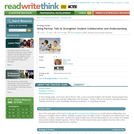
In this strategy guide, you’ll learn about Partner Talk—a way to provide students with another learning opportunity to make learning their own through collaboration and discussion. Partner Talk can be used for assessing classwork, making connections to prior knowledge, discussing vocabulary, or simplifying concepts.
One of the main goals of the English Language Arts Common Core Standards is to build natural collaboration and discussion strategies within students, helping to prepare them for higher levels of education and collaboration in the workforce. In today’s classrooms, students are using complex texts and are being asked to use a variety of strategies and provide evidence-based responses. Partner Talk is a best practice that gives students an active role in their learning and scaffold the experience for students.
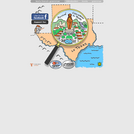
An online pedagogical reference grammar of the French language that combines authoritative grammar explanations, self-correcting exercises and online audio with surreal dialogues and cartoon images.
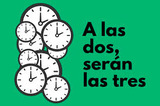
This OER Tiempo (¿qué hora es?) was created by Christopher Guadarrama and as part of the 2024 World Language OER Summer work and training. Educators worked with Chrystal Liu, Nick Ziegler and Dorann Avey to create OER Learning Plans and materials. The attached Lesson Plan is designed for 9 - 12 World Language Arts teachers for Novice Learners of Spanish. Students will analyze and evaluate the elements of literary text, build background knowledge to clarify text and deepen understanding, and use relevant evidence from a variety of sources to assist in analysis and reflection of complex text. This Lesson Plan addresses the following NDE World Language Standard(s): NE LA 12.1.6b, NE LA 12.1.6l, and NE LA 12.1.6oIt is expected that this Lesson Plan will take students 90 minutes to complete.
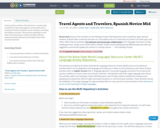
In this activity, students will talk about a vacation they would like to take and engage in conversation about traveling. Students will learn words relating to traveling and taking a vacation. They practice speaking to each other about planning a vacation. Students will also express personal opinions and thoughts about their vacation and hotel.
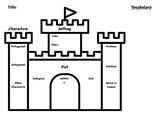
Overview: This OER: Understanding Fairytales with a Graphic Organizer was created by Stephanie Werner and as part of the 2024 World Language OER Summer work and training. Educators worked with Chrystal Liu, Nick Ziegler and Dorann Avey to create OER Learning Plans and materials. The attached Lesson Plan and Graphic Organizer is designed for 7-12 World Language Teachers of Low to Mid level Intermediate Spanish, French or German language learners. It is expected that this Lesson Plan will take students 60 minutes.
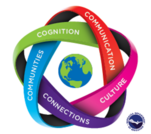
Research shows that engaging students in self-assessment positively impacts language learning, motivation, and learner autonomy. To help World Language Educators accomplish this, the Nebraska Department of Education invited experienced world language teachers across the state to create student-friendly assessments in the form of can-do statements in the summer of 2022. This document is a student-friendly self-assessment activity for Intermediate Low world language learners created based on the 2019 Nebraska World Language Standards. The language use described in all can-do statements is meant for the target language, except for the second for standard 3.1 and the first for standard 4.2. It is recommended that word language teachers engage students with this document three times in an academic year: pre-course, mid-course, and post-course. Engaging students with this self-assessment activity will help students see growth over time and hopefully attribute growth to effective learning practices. Please feel free to contact chrystal.liu@nebraska.gov for any questions and concerns.
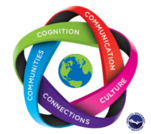
Research shows that engaging students in self-assessment positively impacts language learning, motivation, and learner autonomy. To help World Language Educators accomplish this, the Nebraska Department of Education invited experienced world language teachers across the state to create student-friendly assessments in the form of can-do statements in the summer of 2022. This document is a student-friendly self-assessment activity for Intermediate Low world language learners created based on the 2019 Nebraska World Language Standards. The language use described in all can-do statements is meant for the target language, except for the second for standard 3.1 and the first for standard 4.2. It is recommended that word language teachers engage students with this document three times in an academic year: pre-course, mid-course, and post-course. Engaging students with this self-assessment activity will help students see growth over time and hopefully attribute growth to effective learning practices. Please feel free to contact chrystal.liu@nebraska.gov for any questions and concerns.

4-6 weeks of distance (remote) learning content provided for middle through high school-level world language programs: Chinese, French, Japanese, Korean & Spanish courses. These units were adapted from existing Unit & Pacing guides created by teachers from Tacoma Public Schools in Washington State.